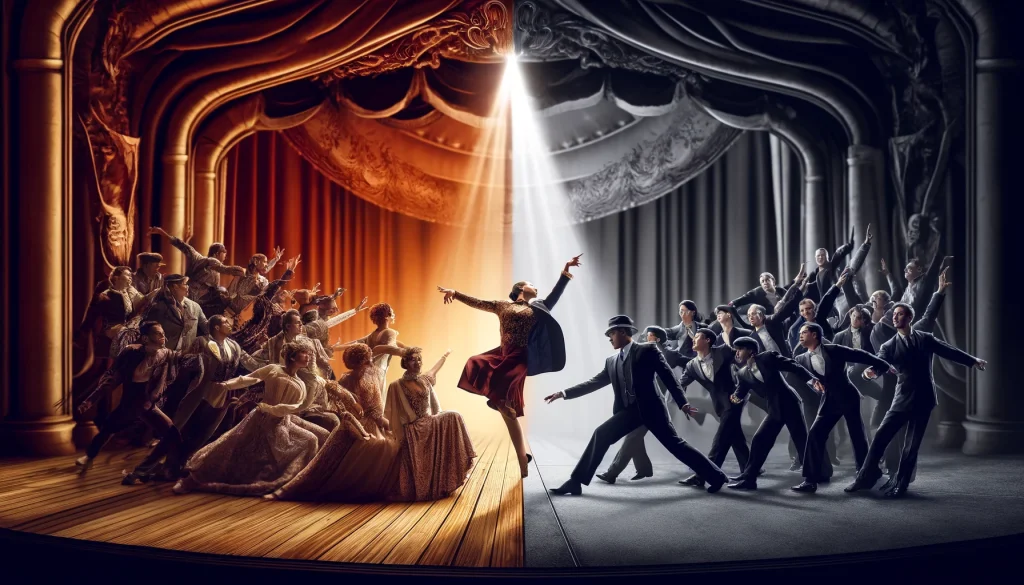In this post, we’ll look at the different options for studying music in a post-secondary institution. We’ll consider the different types of institutions and the degrees you can earn.
Different Types of Schools
There are different types of music schools one can attend for education at the bachelor’s level or above:
- A university with a music major: In this kind of program, you must be accepted into the university, but then have freedom to declare any major you’d like. There’s usually no separate audition for the music program, and the program is often unspecialized, so you can earn a general BA in music, but not a degree in vocal performance or choral conducting, for instance. An example of this is my alma mater, the University of Chicago. While the academic fields of music study there (theory, musicology, composition) are stellar, there is only one unspecialized undergraduate music degree (the BA in music) and there is no special audition to the music school (so any enrolled student can elect to major in music). Because there are no performance majors, they really don’t have infrastructure to support instrumental studies or to provide student performers to play student composers’ works. In fact, for the graduate student composers, they use big-name ensembles in residence (like Eighth Blackbird) in lieu of student musicians to play student works.
- A university with a school of music: In this kind of program, the university has dedicated considerable resources to create a school of music without the university. You would need to be accepted by both the university and the school of music in order to gain admission. These are often comparable to conservatory programs and many of the country’s best music programs fall into this category. Examples include the Shepherd School of Music (Rice University), the Jacobs School of Music (Indiana University), the Yale School of Music, and the Peabody Conservatory (John Hopkins University).
- A music conservatory: This is a stand-alone music school that exists exclusively to educate musicians. Examples include the New England Conservatory, the Cleveland Institute of Music, and Julliard. Students’ course of study is focused on music, though they often take core classes outside of music at a neighboring institution. For instance, students at Cleveland Institute of Music often take math, English, and other academic courses at Case Western Reserve University, which is adjacent to CIM.
Types of Degrees
College/university programs broadly group into undergraduate institutions/degrees and graduate institutions or degrees. “Undergraduate” refers to bachelor’s degrees or lower; “graduate” degrees or programs are those offered after complete the bachelor’s degree. Let’s now consider the most common types of music degrees:
Undergraduate Degrees:
Graduate Degrees:
Associate Degree
The associate degree program is designed to provide students with an undergraduate education that can be completed in two years (though most students take longer and only about a third of students transfer to a four-year within six years — source). Some community colleges offer degree and certificate programs (like audio engineering) that can lead to immediate workforce opportunities. However, most music students will need to transfer to a four-year institution to complete a bachelor’s degree in order to improve their career prospects. In some areas of music, degrees have little bearing, but the additional training students earn in upper education can significantly improve their skills and, in turn, their career prospects.
Community colleges were once thought of as “junior colleges,” implying an undergraduate track that was less challenging for students not yet ready to handle bachelor level studies at a university. However, this has changed over the recent decades and, with the ballooning costs of universities, many superb and highly competitive students are opting to attend community colleges to take their core classes as well as courses in their fields of study at significantly lower costs.
WRITING TIPS: When in a sentence (like in a cover letter), “associate degree” is written without capitalization, as is your major (“I earned an associate degree in music”). Note that there is no apostrophe used in this degree (unlike master’s and bachelor’s degrees). If you write the full degree name, you should capitalize the degree (“I earned an Associate of Arts in music”). The degree may also be capitalized for formatting on a résumé or CV. This degree is abbreviated A.A. (Associate of Arts) or A.S. (Associate of Science).
Bachelor’s Degree
Bachelor’s degrees are earned by completing an undergraduate course of study at a university of conservatory. They take four years to complete (though the average student takes longer, in excess of six years — source). If you’re majoring in music at a university, you’ll likely earn a Bachelor of Arts in music (B.A.). For certain specialty fields, like music technology, you may earn a Bachelor of Science (B.S.) instead. Conservatories or conservatory-level programs sometimes grant a Bachelor of Music degree (B.M.). You may see some other variants (B.Ed. for a Bachelor of Education in music, for example), but these are very rare.
Master’s Degree
Master’s degrees are earned from completing a graduate course of study at a university of conservatory. They typically take two years to complete (though some students, particularly those who attend part-time, will take longer). Most universities will grant a Master of Arts in music (M.A.) or, occasionally, a Master of Science in music (M.S.) for specialized degrees, like music technology. Conservatories or conservatory-level programs sometimes grant a Master of Music (M.M. or M.Mus.) or Master of Musical Arts (M.M.A.) degree. Some institutions grant both the M.A. and M.M., but the requirements for each degree are slightly different (typically more musically demanding for the M.M.). Some institutions also grant music education degrees, like the Master of Education in music (M.Ed.) or the Master of Music Education (M.M.Ed.). Finally, some institutions may grant a Master of Fine Arts (M.F.A.) degree. The M.F.A. is a terminal degree in theatre, so those pursuing degrees in musical theatre will usual earn an M.F.A. as the most advanced degree typically available in their field. Some schools may also grant an M.F.A. in other music fields.
Most master’s degree programs include comprehensive exams in theory and history, a piano proficiency exam, one or more language proficiency exams, and a final document often called the master’s thesis (usually a long paper or, for composers, a large-scale composition). Students are usually required to give a master’s recital too, which might be a lecture-recital.
Artist Diploma and Professional Studies Programs
An artist diploma is a non-degree graduate program usually offered at conservatories or schools of music for exceptionally high level performers. While this doesn’t grant a degree, per se, they do afford opportunities for elite musicians to grow in their craft. Some institutions call these programs Professional Studies programs resulting in a Professional Studies certificate or diploma. These are, again, not degree-granting.
Doctoral Degree
The doctorate in music is usually a Ph.D. (Doctor of Philosophy) or a D.M.A. (Doctor of Musical Arts). While all doctorates may be thought of as teaching degrees, the Ph.D. is typically more of an academic degree, whereas the D.M.A. is more of an applied degree. There are few differences in the programs in terms of coursework or comprehensive exams, but the degrees may have different requirements for the dissertation. For instance, in composition, a D.M.A. program may require a large-scale orchestral piece for the dissertation, whereas a Ph.D. program may require a written dissertation (possibly in addition to a large-scale dissertation composition). Most schools have one program or the other for each individual area of study. In terms of job prospects, there are usually no differences based on if you earned a Ph.D. or a D.M.A.
A doctoral program usually includes three years of coursework, and one or more years to complete the exams and dissertation. Many institutions put a cap on the number of times exams may be taken and/or the number of years a person can take to complete his/her doctorate. Doctoral programs are often fully-funded and may include a small stipend in return for teaching for the institution. The programs are maximally selective, as schools do not want to produce more doctoral graduates than there are higher education teaching jobs available.
The doctoral degree typically includes comprehensive exams in theory and history (often with written and oral exams), a piano proficiency exam, one or more language proficiency exams (in music, these are usually limited to Italian, French, or German), and a doctoral dissertation (including an often public defense). Students are usually required to give a doctoral recital too, which might be a lecture-recital.
A special designation exists for those who have completed the doctoral coursework and exams, but have not yet completed their dissertations: A.B.D. (All But Dead Dissertation). This may be listed on a résumé or CV.
WRITING TIPS: When in a sentence (like in a cover letter), “doctoral degree” or “doctorate” is written without capitalization, as is your field of study (“I earned a doctorate in music”). Note that there is no apostrophe used in this degree (unlike bachelor’s or master’s degrees). If you write the full degree name, you should capitalize the degree (“I earned a Doctor of Musical Arts in composition”). The field of study may also be capitalized for formatting on a résumé or CV. This degree is abbreviated D.M.A. or Ph.D.
References
Burrell, Jackie. “Music Majors: Bachelor of Music vs. Bachelor of Arts.” The Spruce, www.thespruce.com/bachelor-of-music-bachelor-of-arts-3569976. Accessed 21 Apr. 2017.
“Capitalization.” Writing Style Guide, Western Michigan University, wmich.edu/writing/rules/capitalization. Accessed 21 Apr. 2017.
Comments?
What else should students know about the different types of music schools and degrees they can earn? What do you wish you knew about music degrees before venturing into upper education?
©2017 Aaron Alon. All Rights Reserved.
References
Burrell, Jackie. “Music Majors: Bachelor of Music vs. Bachelor of Arts.” The Spruce, www.thespruce.com/bachelor-of-music-bachelor-of-arts-3569976. Accessed 21 Apr. 2017.
“Capitalization.” Writing Style Guide, Western Michigan University, wmich.edu/writing/rules/capitalization. Accessed 21 Apr. 2017.
Comments?
What else should students know about the different types of music schools and degrees they can earn? What do you wish you knew about music degrees before venturing into upper education?
©2017 Aaron Alon. All Rights Reserved.











0 Comments